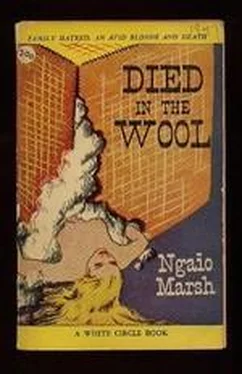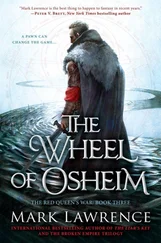Ngaio Marsh - Died in the Wool
Здесь есть возможность читать онлайн «Ngaio Marsh - Died in the Wool» — ознакомительный отрывок электронной книги совершенно бесплатно, а после прочтения отрывка купить полную версию. В некоторых случаях можно слушать аудио, скачать через торрент в формате fb2 и присутствует краткое содержание. Жанр: Классический детектив, на английском языке. Описание произведения, (предисловие) а так же отзывы посетителей доступны на портале библиотеки ЛибКат.
- Название:Died in the Wool
- Автор:
- Жанр:
- Год:неизвестен
- ISBN:нет данных
- Рейтинг книги:4 / 5. Голосов: 1
-
Избранное:Добавить в избранное
- Отзывы:
-
Ваша оценка:
- 80
- 1
- 2
- 3
- 4
- 5
Died in the Wool: краткое содержание, описание и аннотация
Предлагаем к чтению аннотацию, описание, краткое содержание или предисловие (зависит от того, что написал сам автор книги «Died in the Wool»). Если вы не нашли необходимую информацию о книге — напишите в комментариях, мы постараемся отыскать её.
Died in the Wool — читать онлайн ознакомительный отрывок
Ниже представлен текст книги, разбитый по страницам. Система сохранения места последней прочитанной страницы, позволяет с удобством читать онлайн бесплатно книгу «Died in the Wool», без необходимости каждый раз заново искать на чём Вы остановились. Поставьте закладку, и сможете в любой момент перейти на страницу, на которой закончили чтение.
Интервал:
Закладка:
“And if I don’t answer what will you think? What will you do? Go to Mrs. Aceworthy, who dislikes me intensely, and get some monstrously distorted story that she’s concocted. When he was ill he wanted me to look after him and wouldn’t see her or have her here. She’s never forgiven me. Better you should hear the truth, from me.”
“Very much better,” Alleyn agreed cheerfully. “Let’s have it.”
It would have come as something of an anticlimax if it had not made a little clearer the still nebulous picture of that strange companionship. They had been working together over one of Flossie’s articles, he at the table near the windows and Terence moving between him and the bookcases. She had returned to him with a volume of Hansard and had laid it on the table before him, standing behind him and pressing it open with her hand at the passage he had asked for. He leant forward and the rough tweed of his coat sleeve brushed her forearm. They were motionless. She looked down at him but his face was hidden from her. He stooped. Her free hand moved and rested on his shoulder. She described the scene carefully, with precision, as if these details were important, as if, having undertaken her story, she was resolved to leave nothing unsaid. She was, Alleyn thought, a remarkable young woman. She said it was the first passage of its kind between them and she supposed they were both too much moved by it to hear the door open. Her right hand was still upon him when she turned and saw her employer. He was even slower to move and her left hand remained, weighed down by his, upon the open pages of the book. It was only when she pulled it away that he too turned, and saw his wife.
Florence remained in the doorway. She had a sheaf of papers in her hand and they crackled as her grip tightened on them. “Hers was an expressionless face,” Terence said and Alleyn glanced up at the portrait. “Her teeth showed a little, as usual. Her eyes always looked rather startled, they looked no more so, then. She just stared at us.”
Neither Rubrick nor Terence spoke. Florence said loudly: “I’m in a hurry for those reports,” and turned on her heel. The door slammed behind her. Rubrick said to Terence: “My dear, I hope you can forgive me,” and Terence, sure now that he loved her, and feeling nothing but pleasure in her heart, kissed him lightly and moved away. They returned tranquilly to Flossie’s interminable reports. It was strange, Terence said, how little troubled they both were at that time by Flossie’s entrance. It seemed then to be quite irrelevant, something to be dismissed impatiently, before the certainty of their attachment. They continued with their employment, Terence said, and Alleyn had a picture of the two of them at work there, sometimes exchanging a brief smile, more often turning the pages of Hansard, or making notes of suitable platitudes for Flossie. An odd affair, he thought.
This mood of acceptance sustained them through their morning’s work. At luncheon when the party of six assembled, Terence noticed that her employer was less talkative than usual and she realized that she herself was being closely watched by Flossie. This did not greatly disturb her. She thought vaguely: “I suppose she merely said to herself that it’s not much like me to put my hand on anyone’s shoulder. I suppose she thinks it was a bit of presumption on my part. She’s noticing me as a human being.”
At the end of lunch Flossie suddenly announced that she wanted Terence to work with her all the afternoon. She kept Terence hard at it, taking down letters and typing them. It was a perfectly normal routine and at first Terence noticed nothing unusual in Flossie’s manner. Presently, however, she became conscious that Flossie, from behind the table, across the room, or by the fireplace, was watching her closely. She would deny herself the uncomfortable experience of meeting this scrutiny but sooner or later she would find herself unable to resist and would look up and there, sure enough, would be that gimlet-like stare that contrived to be at once so penetrating and so expressionless. Terence began to feel that she could not support this behaviour and to wish, in acute discomfort, that Florence would speak to, or even upbraid, her. The flood of contentment that had come upon her when she knew that Rubrick loved her now receded and left in its wake a sensation of shame. She began to see herself with Flossie’s eyes as a second-rate little typist who flirted with her employer’s husband. She felt sick and humiliated and was filled with a kind of impatience for the worst to happen. There must be a climax, she thought, or she would never recover from the self-disgust that Flossie’s stare had put upon her. But there was no climax. They plodded on with their work. When at last they had finished and Terence was gathering together her papers, Flossie, as she walked to the door, said over her shoulder “I don’t think Mr. Rubrick’s at all well.” Calling him “Mr. Rubrick,” Terence felt, put her very neatly in her place. “I don’t consider,” Florence added, “that we should bother him just now with our silly old statistics. I am rather worried about him. We’ll just leave him quietly to himself, Miss Lynne. Will you remember that?” And she went out, leaving Terence to draw what conclusions she chose from this pronouncement.
“And it was after that,” Terence said, “almost immediately after — it was the same night, at dinner — when the change you all noticed appeared in her manner towards him. To me it was horrible.”
“She decided, in fact,” said Fabian, “to meet you on your own ground, Terry, and give battle.” He added awkwardly: “That doesn’t seem horrible to me; pitiful, rather, and intensely embarrassing. How like her and how futile.”
“But he was devoted to her,” Ursula protested. And as if she had made a discovery that astonished and shocked her, she cried out: “You cheated, Terry. It happened because you were young. You shouldn’t cheat in that way when you’re young. They’re all alike — men of his age. If you’d gone away he’d have forgotten.”
“No!” said Terence strongly.
To Alleyn’s discomfiture they both turned to him.
“He’d have forgotten,” Ursula repeated. “Wouldn’t he?”
“My dear child,” Alleyn said, intensely conscious of his age, “how can I possibly tell?” But when he thought of Arthur Rubrick, ill, and exhausted by his wife’s public activities, he was inclined to believe that Ursula was partly right. With Terence gone, might not the emotion that Rubrick had felt for her have faded soon into an only half-regretful memory?
“You’re all the same,” Ursula muttered, and Alleyn felt himself classed, disagreeably, with Arthur Rubrick, among the senile romantics. “You go queer.”
“Well, but damn it all,” Fabian protested. “If it comes to that, Flossie’s behaviour was pretty queer too. To flirt with your husband after twenty-five years of married life—”
“That was entirely different,” Ursula flashed at him, “and anyway, Terry, if she did, it was your fault.”
“I didn’t do it,” Terence said, for the first time defending herself. “It happened. And until she came into the room it was right. I knew it was right. I knew it completely with my reason as well as with my emotion. It was as if I had suddenly been brought into focus, as if I was, for the first time, completely Me. It couldn’t possibly be wrong.”
She appealed to Ursula and perhaps, Alleyn thought, to the two young men. She asked them for understanding and succeeded in faintly embarrassing them.
“Yes,” said Ursula uncomfortably, “but how you could! With Uncle Arthur! He was nearly fifty.”
Silence followed this statement. Alleyn, who was forty-seven, realized with amusement that Douglas and Fabian found Ursula’s argument unanswerable.
Читать дальшеИнтервал:
Закладка:
Похожие книги на «Died in the Wool»
Представляем Вашему вниманию похожие книги на «Died in the Wool» списком для выбора. Мы отобрали схожую по названию и смыслу литературу в надежде предоставить читателям больше вариантов отыскать новые, интересные, ещё непрочитанные произведения.
Обсуждение, отзывы о книге «Died in the Wool» и просто собственные мнения читателей. Оставьте ваши комментарии, напишите, что Вы думаете о произведении, его смысле или главных героях. Укажите что конкретно понравилось, а что нет, и почему Вы так считаете.










